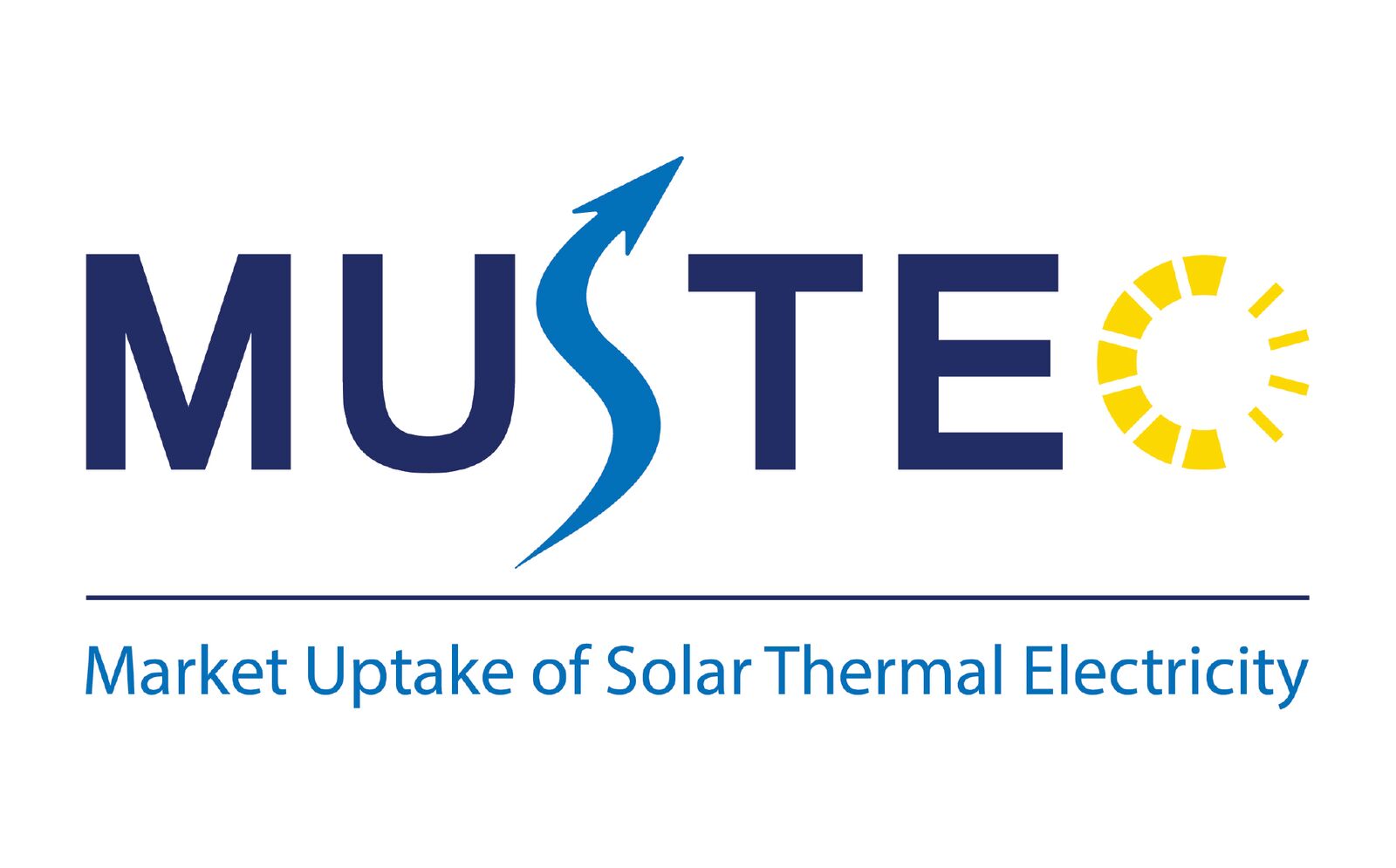
H2020 MUSTEC Project: Market adoption of solar thermal electricity through cooperation
- Type Project
- Status Filled
- Execution 2017 -2021
- Assigned Budget 2.396.526,13 €
- Scope Europeo
- Main source of financing Horizon 2020
- Project website MUSTEC
The project has identified relevant issues that could be either an obstacle or a determining factor for the future supply of flexible electricity from CSP plants in southern, central, and northern European countries, suggesting policy interventions that address both barriers and drivers to the diffusion of the technology, as well as drivers and barriers to participation in cooperation mechanisms.
The study has shown that, in recent years, global CSP deployment has slowed and shifted away from Europe. Currently, the European CSP industry faces serious challenges and competition from new entrants, mainly from Asia. There are concerns that this trend could lead to the demise of many European companies and, over time, the dissolution of CSP innovation networks. In recent years, the levelized cost of electricity for CSP has seen a clear downward trend, but it still needs to be reduced to make CSP more competitive.
In addition to ongoing, targeted R&D efforts to improve the efficiency of CSP power generation, as well as specific implementation support, key elements include creating a favorable investment framework and providing financing tools to help cover the risks associated with project implementation. This requires ambitious energy and climate policies that establish appropriate price signals and reflect the value of flexibility in the electricity system. Likewise, a stable political framework and the continuity of renewable energy policy, both at the national and European levels, are crucial factors.
Regional cooperation should be fostered through the development of concrete regulatory solutions and related pilot projects, and national and regional energy security strategies should recognize the value of cooperation in renewable energy in general and the opportunities offered by CSP in particular. Likewise, the development of cross-border transmission grid infrastructure is crucial.
Policy measures should allow for targeted (i.e., technology-specific) support and support policies for renewable energy, and in particular, the design of renewable energy auctions should better value the positive impacts of the system, such as storage and CSP manageability. Furthermore, to stimulate and facilitate the use of renewable energy cooperation mechanisms among EU Member States, a clearer statement and a more targeted support framework at the EU level are crucial to reduce the added complexity of cooperative renewable energy project development. Policy measures under the EU's "enabling framework" could help reduce the costs of CSP projects. Auctions under the "EU financing mechanism" should be technology-specific and specifically address CSP. Financing of "CSP projects in RES" through the Connecting Europe Facility (CEF) should take into account the requirements of CSP projects (e.g., regarding project implementation times and investment volumes).
A balanced policy mix should also include indirect measures to improve communication of the benefits of renewable energy cooperation and foster public acceptance. In this regard, the implementation of transparent procedures that facilitate the participation of local stakeholders and support the realization of potential local benefits is crucial to fostering local acceptance of solar thermal energy cooperation projects.
The results of the MUSTEC project have been widely disseminated through conferences, events, scientific publications, and two videos.
Concentrated solar power (CSP) could play an important role in the future European energy market, offering a number of potential benefits aligned with European energy policy objectives.
First, CSP can produce high-value, dispatchable energy on demand to balance intermittent sources and thus contribute to the energy transition. Second, cross-border CSP trading would support the EU's goal of cost-effectively decarbonizing the electricity system through cooperation between Member States.
CSP trading from southern to central and northern Europe can therefore increase the stability of a future highly renewable electricity system and reduce overall system costs.
In this context, the overall objective of MUSTEC is to assess the existing barriers and opportunities for CSP to play a key role in the future European electricity system by delivering firm electricity from southern to northern European countries, and to develop and propose concrete policy instruments to overcome the barriers preventing the realization of specific types of CSP and intra-European CSP trading projects.
Within the EU Climate and Energy Framework for 2030, MUSTEC seeks to explore and propose concrete solutions to overcome the various factors hindering the deployment of concentrated solar power (CSP) projects in Southern Europe, capable of supplying on-demand renewable electricity to Central and Northern European countries.
To this end, the project will analyze the factors that drive and hinder CSP deployment and renewable energy (RE) cooperation in Europe, identify future opportunities for CSP cooperation, and propose a set of concrete measures to harness the existing potential. To achieve these objectives, MUSTEC will build on the experience and knowledge generated around cooperation mechanisms and developments in the CSP industry, based on concrete CSP case studies.
The current and future design and policies of the European energy market will be considered, as well as the value of CSP in electricity markets and the related economic and environmental benefits. In this regard, MUSTEC combines a targeted, comprehensive, and multidisciplinary analysis of past, present, and future opportunities for cooperation in CSP with ongoing collaboration and consultation with policymakers and market participants. This will be achieved through intensive and ongoing dialogue with stakeholders and the establishment of a tailored knowledge-sharing network.
The MUSTEC consortium is comprised of nine renowned institutions from six European countries and includes many of the most prolific researchers in the European energy policy community, with a long history of research in European and nationally funded energy policy research projects.
Based on the above findings, MUSTEC has proposed specific policy interventions and developed a detailed Roadmap and Action Plan.
The work at MUSTEC has addressed the concerns of five broad stakeholder groups, including (1) policy makers at European and national levels, (2) various market participants, (3) the European/global CSP industry, (4) the scientific community, and (5) civil society.
The work carried out has served to promote CSP technology and stimulate debate on this technology at the political level. The idea of a potential CSP cooperation project has been promoted at the national and regional levels. At the European level, the Spanish Ministry for Ecological Transition and the Demographic Challenge has been awarded a Technical Assistance service offered by the European Commission ( https://www.hdcefenergy.eu/ ) for potential bio-based renewable energy projects under the new CEF financing line, in order to further develop the idea of the MUSTEC cooperation project.
Work at MUSTEC has also addressed the concerns of various market participants and the European/global CSP industry. These stakeholders have been regularly consulted throughout the project, and their opinions and feedback on our project results have been duly taken into account and incorporated into our recommendations to further amplify the project's impact. Impacts on the scientific community have also been promoted through publication in scientific journals and participation in scientific conferences.
A detailed sustainability impact assessment was conducted for a potential cooperation project. The results showed that the implementation of a CSP power plant will create added value and employment, primarily in Europe, and that the electricity generated will have a low carbon and water footprint. However, there are some potential social risks in the CSP value chain that need to be minimized. Compared to an equivalent system in terms of flexibility and manageability using photovoltaic panels and batteries, CSP performs better on all the sustainability indicators analyzed.
The project also investigated the geopolitical and energy security implications of CSP. We showed that, despite significant advantages in traditionally "hard" policy fields—both geopolitics (e.g., lower import dependence) and energy security (e.g., a source of renewable manageability)—CSP is not an issue in European energy and geopolitical policy. CSP is considered a niche technology, and cooperation mechanisms are considered niche institutional innovations. Moreover, CSP can be an enabling technology for the overall energy transition: since CSP can balance wind and PV, it can enable the continued and secure deployment of these technologies, facilitating ongoing decarbonization and creating more jobs in technologies other than CSP itself. Therefore, accelerating CSP cooperation would be an appropriate EU response to the COVID-19 crisis, serving both the EU's geopolitical objectives and the goals of the European Green Deal.
- CENTRO DE INVESTIGACIONES ENERGETICAS MEDIOAMBIENTALES Y TECNOLOGICAS (CIEMAT)







